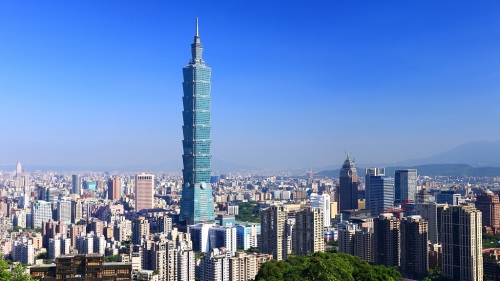
学术交流
Opinion | Taiwan paying a big price for DPP's wrong policies
By Zhong Houtao | China Daily | Updated: 2024-01-03

The Taipei 101 skyscraper in Taipei, Taiwan, China. [Photo/Xinhua]
In her recent "new year address", Taiwan's current leader, Tsai Ing-wen, has conveyed worrying signals that could lead to disastrous consequences for the island. The so-called "Tsai Ing-wen path" represents a path towards "Taiwan independence" and confrontation, which poses a significant threat to Taiwan's security, the interests of its people, and regional stability. Since the Democratic Progressive Party (DPP) assumed power in 2016, they have rejected the 1992 Consensus that recognizes one China and instead adopted a "pro-Taiwan independence" stance, exacerbating tensions in the Taiwan Strait.
In stark contrast, the authorities on the mainland have been making continuous efforts to enhance cross-Strait exchanges, aiming to genuinely improve the well-being of Taiwan residents. For instance, the Communist Party of China Central Committee and the State Council, the country's Cabinet, have unveiled a decision on supporting Fujian province to explore a new path for cross-Strait integration and build a demonstration zone for improving cross-Strait ties. And 10 concrete measures have been implemented since Jan 1. The move can help maintain peace and promote prosperity across the Taiwan Strait.
However, the DPP, in a bid to strengthen its political position, has intensified its provocative moves, adding fuel to the fire. In fact, it is playing the "double independence" card by selecting "Taiwan independence advocate" Lai Ching-te and "hardcore Taiwan independence proponent" Hsiao Bi-khim to seek power of the island.
Lai has a history of advocating "Taiwan independence", and is a self-proclaimed "pragmatic advocate of independence", and Hsiao is a die-hard supporter of this ideology. This pair of two staunch "Taiwan independence" advocates is likely to intensify separatist tendencies and push Taiwan onto an irreversible path to doom.
Despite a record-high 2024 defense budget of NT$606.8 billion ($19.7 billion), nearly 3 percent of the island's GDP, Taiwan is not becoming safer. The island's defense spending continues to rise, yet it finds itself "sitting on a powder keg". The island's emphasis on military buildup, aligned with the United States' provocative plans, is aimed at positioning Taiwan as a hedgehog against the Chinese mainland, but the outcome is a sense of increasing danger and concern among Taiwan residents, especially youths.
If the pro-independence forces continue to grip power on the island, they will make greater efforts to please the US, potentially sacrificing Taiwan's key industries, such as semiconductor manufacturing. This risky move could hollow out Taiwan's industries and cause a brain drain as talents would follow relocating industries to the US.
Since 2016, the DPP has neglected the island's economic and social development. Rather than focusing on people's economic well-being, the DPP has been indulging in political vendetta, wrongly believing that eliminating political opponents would help it remain in power.
The DPP's mismanagement and corruption have taken a toll on the island's economy, with the expected GDP growth rate in 2023 being a dismal 1.4 percent, a 14-year low.
The recent"2023 Chinese character" poll results in Taiwan reveal the public's sentiment. "Que", or "lack" secured the top spot in the poll with 8,565 votes, followed by "dan", or "egg". The combination of the two Chinese characters for "lack" and "eggs" highlights the pressing issue of shortage of eggs, symbolizing the DPP's governance failures. In fact, the discontent among Taiwan residents is palpable, with many of them openly expressing their frustration.
Shortages in Taiwan go beyond eggs to water, electricity, land, labor, talents and, most critically, peace. As an export-oriented economy, Taiwan relies heavily on a stable regional environment for import of raw materials and export of finished products.
It is this fear that prompted many Taiwan residents to say that the island won't thrive unless the DPP falls.
The DPP's pursuit of foreign alliances and its military ambitions have escalated tensions across the Strait. This is not surprising because DPP leaders have been advocating "Taiwan independence", which amounts to a call to military conflict.At this critical juncture, Taiwan has to choose between peace and military conflict, and prosperity and decline. The mainstream sentiment in Taiwan favors peace over conflict, development over upheaval, dialogue over animosity, and cooperation over confrontation. It is important therefore that Taiwan residents adhere to the 1992 Consensus, oppose "Taiwan independence", and recognize the dangers posed by the DPP's separatist agenda.The Taiwan compatriots should fully understand the destructive nature of the DPP's scheme, do their part in steering cross-Strait relations back onto the right track of peaceful development, and safeguard peace and stability in the Taiwan Strait as well as their own safety and wellbeing. Making the right choices at this pivotal moment will contribute to maintaining peace across the Strait and foster peaceful cross-Strait relations.
The author is an associate professor at the school of national security, University of International Relations.